2008云南特岗教师招聘考试小学英语科目二真题及答案
2008年 云南特岗教师招聘考试 笔试 学科 初中 英语 真题答案解析
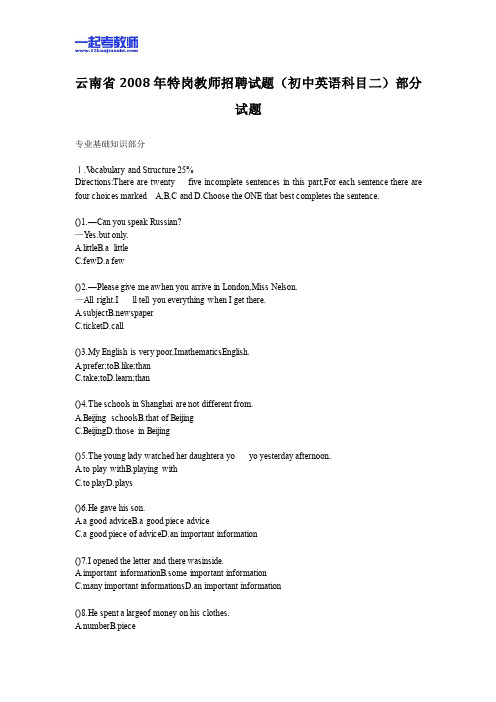
云南省2008年特岗教师招聘试题(初中英语科目二)部分试题专业基础知识部分Ⅰ.V ocabulary and Structure 25%Directions:There are twenty five incomplete sentences in this part,For each sentence there are four choices marked A,B,C and D.Choose the ONE that best completes the sentence.()1.—Can you speak Russian?—Y es.but only.A.littleB.a littleC.fewD.a few()2.—Please give me awhen you arrive in London,Miss Nelson.—All right.I ll tell you everything when I get there.A.subjectB.newspaperC.ticketD.call()3.My English is very poor,ImathematicsEnglish.A.prefer;toB.like;thanC.take;toD.learn;than()4.The schools in Shanghai are not different from.A.Beijing schoolsB.that of BeijingC.BeijingD.those in Beijing()5.The young lady watched her daughtera yo yo yesterday afternoon.A.to play withB.playing withC.to playD.plays()6.He gave his son.A.a good adviceB.a good piece adviceC.a good piece of adviceD.an important information()7.I opened the letter and there wasinside.A.important informationB.some important informationC.many important informationsD.an important information()8.He spent a largeof money on his clothes.A.numberB.pieceC.dealD.amount()9.Mr.Johnson used to be a and now is working in a.A.chemical teacher;chemical worksB.chemical teacher;chemistry worksC.chemistry teacher;chemical worksD.teacher of chemicals;chemistry works()10.He is an experienced teacher,that is to say,he has.A.many experiencesB.much experiencesC.a lot of experienceD.little experience()11.Jack has studied Chinese in this schoolthe year of 2006.A.sinceB.byC.forD.in()12.I walked too much yesterday andare still aching now.A.my leg s musclesB.my muscles of legC.my leg musclesD.my muscles of the leg()13.My husband lived at home before we got married,and so.A.did IB.had IC.I hadD.I did()14.E mail,as well as telephones,an important part in daily communication.A.is playingB.have playedC.are playingD.play()15.The wind is blowing,sorain is on the way.A.hard;heavyB.big;largeC.great;mostD.strong;heavily()16.The soldier savedboy.A.an eleven year oldB.an eleven year oldC.a eleven year oldD.a eleven years old()17.Sam likes music very much.He livesbut he never feels.A.alone;lonelyB.alone;aloneC.lonely;aloneD.lonely;lonely()18.Billy didn t come to school this morning.What happenedhim?A.withB.forC.toD.in()19.She was gladher friends again.A.seeB.sawC.seeingD.to see()20.Let severy Monday after school.A.practice dancingB.practice to danceC.to practice dancingD.to practice to dance()21.Will youcome to me tomorrow?A.canB.wouldC.be able toD.may()22.There s a lot of outside when he is trying to sleep.A.noiseB.noisesC.noisyD.noisily()23.Can you hear someonein the next room?A.singB.singsC.singingD.sang()24.Shefeed the cat,since her parents do it for her.A.don t have toB.has not toC.haven t toD.doesn t have to()25.—Must I walk the dog in the park now?—No,you.A.mustn tB.needn tC.can tD.may notⅡ.Reading Comprehension 20%Directions:There are two passages in this part.Each passage is followed by five questions or unfinished statements.For each of them there are four choices marked A,B,C and D.Y ou should decide on the BEST CHOICE.Passage 1When young people get their first real jobs,they may face a lot of new,confusing situations. They may find that everything is different from the way things were at school.It is also possible that they will feel uncomfortable and insecure in both professional and social situations.Eventually,they realize that university classes can t be the only preparation for all of the different situations that arise in the working world.Perhaps the best way to learn how to behave in the working world is to identify a worker you admire and observe his behavior.In doing so:you will be able to see what it is that you admire in this person.For example,you will observe how he acts in a crisis.Perhaps even more important,youwill be able to see what kind of his approach to day to day situations is.While you are observing your colleague,you should be asking yourself whether his behavior is like yours and how you can learn from his responses to a variety of situations.By watching and learning from a model,you will probably begin to identify and adopt good working habits.()1.The main idea of the first paragraph is.A.what the young people learn in university classes is not adequate for their new lifeB.the young men are not well educatedC.the society is too complicated to adopt toD.they fail to work hard at school()2.In the first paragraph,the word “arise” means “”.A.bring aboute into beingC.occur toD.cause to happen()3.The best way to learn how to behave in the working world is.A.to find a worker and follow him closelyB.to find a person you admire and make friends with himC.a person you respect and watch carefully how he acts in different situationsD.to get acquainted with a model you admire()4.In second paragraph,the word “approach” means.A.means of enteringB.ways of coming near toC.manner of doing somethingD.speaking to someone for the first time()5.The best title is.A.Learn From a ModelB.Learn ForeverC.Learn,Learn and Learn AgainD.One is Never Too Old to LearnPassage 2试题由中人教育独家提供,任何网站如需转载,均需得到中国教育在线教师招聘频道和中人教育双方的书面许可,否则追究法律责任。
2008英语试题及答案

2008英语试题及答案一、听力理解(共20分)1. What is the woman going to do this evening?A. Visit her parents.B. Go to the cinema.C. Do some shopping.2. How much will the man pay for the tickets?A. $20.B. $25.C. $30.3. What time does the train leave?A. At 6:15 a.m.B. At 7:15 a.m.C. At 8:15 a.m.4. Where are the speakers?A. In a restaurant.B. At a bank.C. In a library.5. What does the woman mean?A. She doesn't like the gift.B. She thinks the gift is too expensive.C. She wants to buy something else.二、阅读理解(共30分)Passage 16. What is the main idea of the passage?A. The importance of sleep.B. The effects of sleep deprivation.C. The benefits of taking naps.7. According to the passage, which of the following is NOT a sign of sleep deprivation?A. Difficulty in concentrating.B. Frequent mood swings.C. Increased appetite.8. What does the author suggest to improve sleep quality?A. Taking naps during the day.B. Reducing caffeine intake.C. Exercising before bedtime.Passage 29. What is the purpose of the article?A. To introduce a new technology.B. To discuss the impact of technology on employment.C. To predict the future of technology.10. Which of the following is NOT mentioned as a benefit of automation?A. Increased productivity.B. Reduced labor costs.C. Improved job satisfaction.11. What does the author think about the future of employment?A. It will be significantly affected by automation.B. It will remain largely unchanged.C. It will be completely replaced by machines.Passage 312. What is the author's opinion about the new policy?A. It is too restrictive.B. It is necessary for the environment.C. It will have a negative impact on the economy.13. What is the main reason for implementing the policy?A. To reduce traffic congestion.B. To improve air quality.C. To encourage public transportation.14. How does the author suggest the policy could be improved?A. By providing more public transportation options.B. By allowing exceptions for certain vehicles.C. By offering financial incentives for carpooling.三、完形填空(共20分)15. A. althoughB. becauseC. unless16. A. interestedB. boredC. excited17. A. decidedB. hesitatedC. refused18. A. despiteB. in spite ofC. because of19. A. leftB. arrivedC. returned20. A. worriedB. surprisedC. disappointed四、翻译(共15分)21. 随着经济的快速发展,环境污染问题日益严重。
云南省2008年某市特岗教师招考教育理论综合知识试卷及答案(改)
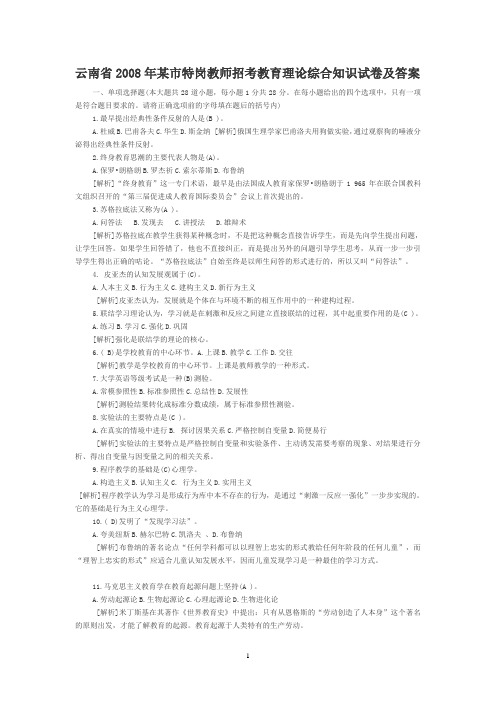
云南省2008年某市特岗教师招考教育理论综合知识试卷及答案一、单项选择题(本大题共28道小题,每小题1分共28分。
在每小题给出的四个选项中,只有一项是符合题目要求的。
请将正确选项前的字母填在题后的括号内)1.最早提出经典性条件反射的人是(B )。
A.杜威B.巴甫各夫C.华生D.斯金纳 [解析]俄国生理学家巴甫洛夫用狗做实验,通过观察狗的唾液分泌得出经典性条件反射。
2.终身教育思潮的主要代表人物是(A)。
A.保罗•朗格朗B.罗杰祈C.索尔蒂斯D.布鲁纳[解析]“终身教育”这一专门术语,最早是由法国成人教育家保罗•朗格朗于1 965年在联合国教科文组织召开的“第三届促进成人教育国际委员会”会议上首次提出的。
3.苏格拉底法又称为(A )。
A.问答法B.发现去C.讲授法D.雄辩术[解析]苏格拉底在教学生获得某种概念时,不是把这种概念直接告诉学生,而是先向学生提出问题,让学生回答。
如果学生回答错了,他也不直接纠正,而是提出另外的问题引导学生思考,从而一步一步引导学生得出正确的咕论。
“苏格拉底法”自始至终是以师生问答的形式进行的,所以又叫“问答法”。
4. 皮亚杰的认知发展观属于(C)。
A.人本主义B.行为主义C.建构主义D.新行为主义[解析]皮亚杰认为,发展就是个体在与环境不断的相互作用中的一种建构过程。
5.联结学习理论认为,学习就是在刺激和反应之间建立直接联结的过程,其中起重要作用的是(C )。
A.练习B.学习C.强化D.巩固[解析]强化是联结学的理论的核心。
6.( B)是学校教育的中心环节。
A.上课B.教学C.工作D.交往[解析]教学是学校教育的中心环节。
上课是教师教学的一种形式。
7.大学英语等级考试是一种(B)测验。
A.常模参照性B.标准参照性C.总结性D.发展性[解析]测验结果转化成标准分数成绩,属于标准参照性测验。
8.实验法的主要特点是(C )。
A.在真实的情境中进行B. 探讨因果关系C.严格控制自变量D.简便易行[解析]实验法的主要特点是严格控制自变量和实验条件、主动诱发需要考察的现象、对结果进行分析、得出自变量与因变量之间的相关关系。
特岗小学英语笔试题及答案
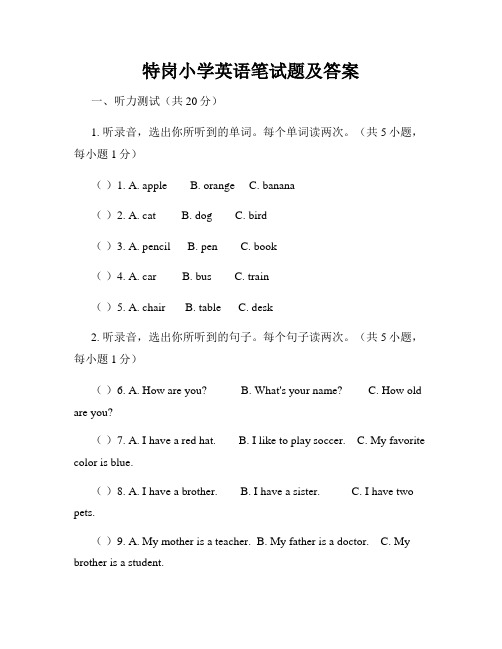
特岗小学英语笔试题及答案一、听力测试(共20分)1. 听录音,选出你所听到的单词。
每个单词读两次。
(共5小题,每小题1分)()1. A. apple B. orange C. banana()2. A. cat B. dog C. bird()3. A. pencil B. pen C. book()4. A. car B. bus C. train()5. A. chair B. table C. desk2. 听录音,选出你所听到的句子。
每个句子读两次。
(共5小题,每小题1分)()6. A. How are you? B. What's your name? C. How old are you?()7. A. I have a red hat. B. I like to play soccer. C. My favorite color is blue.()8. A. I have a brother. B. I have a sister. C. I have two pets.()9. A. My mother is a teacher. B. My father is a doctor. C. My brother is a student.()10. A. I can swim. B. I can sing. C. I can dance.3. 听录音,根据你所听到的问题,选出正确的答句。
每个句子和问题读两次。
(共5小题,每小题1分)()11. A. I am fine, thank you. B. I am 8 years old. C. My name is Tom.()12. A. Yes, I have. B. No, I haven't. C. Yes, I can.()13. A. It's red. B. It's a chair. C. It's on the table.()14. A. I have a book. B. It's a yellow book. C. I like to read books.()15. A. My favorite color is blue. B. I like to play with my friends.C. I can play soccer.二、笔试部分(共80分)一、单项选择(每小题1分,共10小题)()16. __________ this your bag?A. WhatB. WhereC. Is()17. I _______ a computer at home.A. haveB. hasC. have got()18. She _______ her homework every day.A. doB. doesC. did()19. ________ your mother a teacher?A. IsB. DoesC. Are()20. What ________ you like?A. doB. doesC. are()21. ________ are your grandparents?A. HowB. WhereC. Who()22. I ________ a student.A. amB. isC. are()23. ________ our schoolbag in the classroom?A. AreB. IsC. Do()24. ________ two pencils in the box.A. They haveB. There areC. There is()25. ________ you like to play soccer?A. DoB. DoesC. Are二、完形填空(每小题1分,共10小题)阅读下面的短文,选择合适的词填入空格内,使短文内容完整。
小学英语教资考试真题及答案科目二
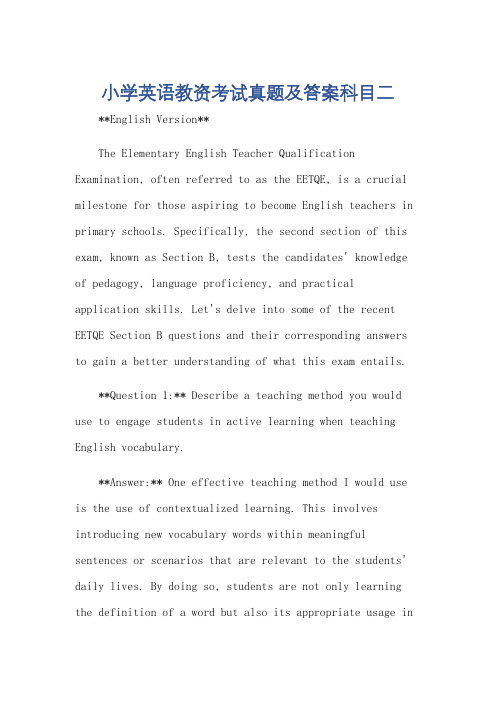
小学英语教资考试真题及答案科目二**English Version**The Elementary English Teacher Qualification Examination, often referred to as the EETQE, is a crucial milestone for those aspiring to become English teachers in primary schools. Specifically, the second section of this exam, known as Section B, tests the candidates' knowledge of pedagogy, language proficiency, and practical application skills. Let's delve into some of the recent EETQE Section B questions and their corresponding answers to gain a better understanding of what this exam entails. **Question 1:** Describe a teaching method you would use to engage students in active learning when teaching English vocabulary.**Answer:** One effective teaching method I would use is the use of contextualized learning. This involves introducing new vocabulary words within meaningful sentences or scenarios that are relevant to the students' daily lives. By doing so, students are not only learning the definition of a word but also its appropriate usage inreal-world situations. This active learning approach encourages students to participate actively in the learning process, making it more engaging and memorable.**Question 2:** Explain how you would differentiate your teaching approach to cater to the needs of diverse learners in your classroom.**Answer:** Recognizing that every student learns differently, I would differentiate my teaching approach by addressing their individual needs. For example, visual learners may benefit from the use of charts, diagrams, and videos to illustrate concepts. Auditory learners, on the other hand, may prefer storytelling or discussions to enhance their understanding. Additionally, I would provide additional support and resources to students who require extra attention or have specific learning challenges. By tailoring my teaching style to each student's learning preferences, I aim to create an inclusive learning environment where all students can achieve their full potential.**Question 3:** Describe a challenging situation you have faced in the classroom and how you handled it.**Answer:** A challenging situation I have faced in the classroom was when a student consistently refused to participate in class activities. To address this, I first sought to understand the underlying reason for his reluctance. Through open communication, I discovered that he was feeling overwhelmed and intimidated by the English language. To help him overcome these barriers, I implemented a series of strategies such as providing extra tutoring sessions, encouraging him to work in smaller groups, and praising his efforts and progress. Gradually, his confidence improved, and he began to engage more actively in class. This experience taught me the importance of patience, understanding, and adaptability when dealing with challenging situations in the classroom.The EETQE Section B not only tests the candidates' subject knowledge but also their ability to apply pedagogical principles effectively in real-world scenarios. By preparing for this section thoroughly, candidates can demonstrate their competency as teachers who are not only knowledgeable but also skilled in engaging and motivating young learners.**Chinese Version**小学英语教师资格考试,简称“小英考”,是众多希望成为小学英语教师的考生的重要里程碑。
小学英语教资考试真题及答案科目二
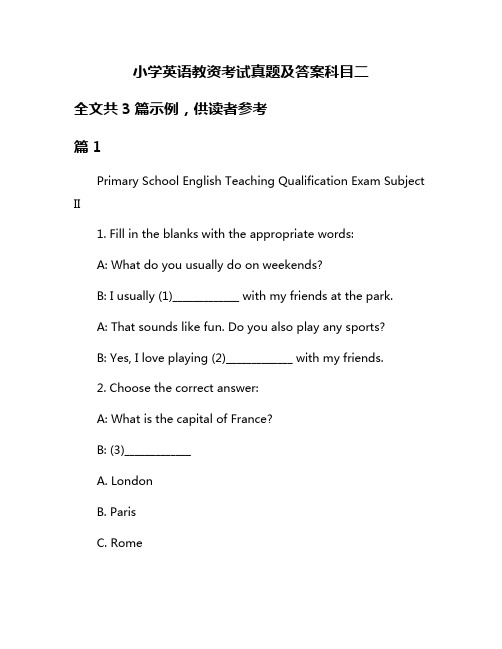
小学英语教资考试真题及答案科目二全文共3篇示例,供读者参考篇1Primary School English Teaching Qualification Exam Subject II1. Fill in the blanks with the appropriate words:A: What do you usually do on weekends?B: I usually (1)_____________ with my friends at the park.A: That sounds like fun. Do you also play any sports?B: Yes, I love playing (2)_____________ with my friends.2. Choose the correct answer:A: What is the capital of France?B: (3)_____________A. LondonB. ParisC. Rome3. Rewrite the following sentence using the present continuous tense:I eat breakfast every morning.(4)_____________4. Fill in the blanks with the correct form of the verb:A: What (5)_____________ you doing when the phone rang?B: I (6)_____________ my homework.5. Give synonyms for the following words:A. HappyB. Smart(7)_____________6. Give the opposite of the following words:A. TallB. Fast(8)_____________7. Look at the pictures and write a sentence for each:1. (9)_____________2. (10)_____________3. (11)_____________8. Read the paragraph and answer the questions:Lily is a student at Greenfield Elementary School. She loves going to school and playing with her friends during recess. Her favorite subject is English, and she enjoys reading storybooks in the school library.Questions:a. Where does Lily study?b. What is Lily's favorite subject?9. Write a short paragraph about your favorite hobby.10. Read the passage and answer the questions:I usually wake up at 7 o'clock in the morning. I brush my teeth and wash my face. Then, I have breakfast with my family before heading to school. After school, I like to play soccer with my friends in the park.Questions:a. What time does the person usually wake up?b. What does the person do after school?Answers:1. play, soccer2. B. Paris3. I am eating breakfast every morning.4. were, doing5. A. Joyful, B. Intelligent6. A. Short, B. Slow7. (Answers may vary)8. a. Greenfield Elementary School, b. English9. (Answer may vary)10. a. 7 o'clock in the morning, b. Play soccer with friends.篇2Primary School English Teaching Qualification Examination Subject TwoPart One: Listening Comprehension (30 points)Section A: Listen to the sentence, choose the correct picture.(5 points)1. Which picture shows a cat chasing a mouse?2. Which picture shows a boy playing football?3. Which picture shows a girl riding a bicycle?4. Which picture shows a girl reading a book?5. Which picture shows a boy jumping on a trampoline?Section B: Listen to the conversation and answer the questions. (10 points)1. What did Tom do on his summer vacation?2. Where did Sarah go on her last vacation?3. What is Amy going to do this weekend?4. Why did John miss the concert last night?5. How does Mary usually go to school?Section C: Listen and fill in the blanks. (15 points)1. My mother is a ____________.2. I have two brothers and one ____________.3. I like to play ____________ in the park.4. We are going on a ____________ this weekend.5. My favorite ____________ is pizza.Part Two: Reading Comprehension (40 points)Section A: Read the passage and answer the following questions. (20 points)The Tortoise and the HareOnce upon a time, there was a quick hare and a slow tortoise. The hare always made fun of the tortoise because he was so slow. One day, the tortoise challenged the hare to a race. The hare laughed at him and accepted the challenge. The race began and the hare quickly ran ahead of the tortoise. But the hare became overconfident and decided to take a nap. Meanwhile, the tortoise kept on going and eventually crossed the finish line before the hare!1. Who was faster, the hare or the tortoise?2. Why did the tortoise challenge the hare to a race?3. What did the hare do during the race?4. Who won the race in the end?5. What lesson did the hare learn from the race?Section B: Read the passage and fill in the blanks. (10 points)My name is Patrick and I am six years old. I live in a small____________ in the countryside. I have a pet dog named Rocky. He is a ____________ and loves to play fetch. My favorite toy is a____________ that my grandfather gave me. I like to play with it in the garden. Every weekend, my family goes to the ____________ to have a picnic.Part Three: Writing (30 points)Write a short composition (about 100 words) on the following topic: "My Favorite Season"In my opinion, my favorite season is summer. I love the warm weather and long days. During the summer, I can go swimming, play in the park, and have picnics with my friends. I also enjoy eating ice cream and watermelon. Summer is a time for relaxation and fun activities. I look forward to spending time outdoors and enjoying the sunshine.Answer Key:Part One:Section A:1. A2. C3. B4. E5. DSection B:1. He went to the beach.2. She visited her grandparents.3. She is going hiking.4. He had to study for an exam.5. She walks to school. Section C:1. teacher2. sister3. soccer4. camping trip5. foodPart Two:Section A:1. The hare was faster.2. The tortoise challenged the hare because he was always making fun of him.3. The hare took a nap.4. The tortoise won the race.5. The hare learned not to be overconfident.Section B:1. village2. beagle3. toy car4. parkPart Three:My Favorite SeasonSummer is my favorite season. I love the warm weather and long days. During the summer, I can go swimming, play in the park, and have picnics with my friends. I also enjoy eating ice cream and watermelon. Summer is a time for relaxation and fun activities. I look forward to spending time outdoors and enjoying the sunshine.篇3如您想要获取关于【小学英语教资考试真题及答案科目二】的文档,以下是一份模拟真题供您参考:Part 1: Listening ComprehensionDirections: In this part of the test, you will hear some dialogues and questions spoken in English. The dialogues and questions will be spoken twice. After you hear a dialogue and the question about it, read the four possible answers and decide which one would be the best answer to the question you have heard.1. (A) It’s on the table.(B) It’s blue.(C) It’s her book.(D) It’s running.2. (A) She has a sore throat.(B) She’s happy.(C) She’s eating dinner.(D) She’s going to the beach.3. (A) A newspaper.(B) A magazine.(C) A book.(D) A letter.4. (A) Monday.(B) Friday.(C) Sunday.(D) Wednesday.5. (A) Go by bus.(B) Go by car.(C) Go by subway.(D) Go by plane.Part 2: Reading ComprehensionDirections: There are 5 passages in this part. Each passage is followed by some questions or unfinished sentences. For each of them there are four choices, marked A, B, C and D. You should decide on the best choice.Passage 1:Hello, my name is Sarah. I am from England. I am a teacher. I work in a big school in London. I teach English to young children.6. What is Sarah’s job?(A) Doctor.(B) Teacher.(C) Nurse.(D) Engineer.7. Where does Sarah work?(A) London.(B) Paris.(C) New York.(D) Sydney.Passage 2:Amy and Tom are brother and sister. They like to play baseball together. They play every Saturday in the park near their house.8. Who likes to play baseball?(A) Amy.(B) Tom.(C) Amy and Tom.(D) None of them.9. When do they play baseball?(A) Monday.(B) Tuesday.(C) Friday.(D) Saturday.Part 3: WritingDirections: You are allowed 30 minutes to write a composition on the topic “My Favorite Season”. You should write at least 80 words according to the outline given below in Chinese:1. 说明你最喜欢的季节是哪一个;2. 为什么你喜欢这个季节;3. 你在这个季节里通常做些什么活动。
云南省特岗教师招聘小学英语(教育理论综合知识)历年真题试卷汇
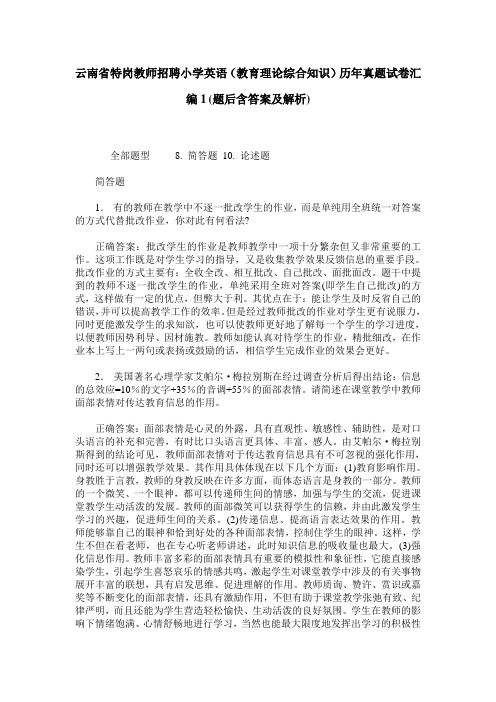
云南省特岗教师招聘小学英语(教育理论综合知识)历年真题试卷汇编1(题后含答案及解析)全部题型8. 简答题10. 论述题简答题1.有的教师在教学中不逐一批改学生的作业,而是单纯用全班统一对答案的方式代替批改作业,你对此有何看法?正确答案:批改学生的作业是教师教学中一项十分繁杂但又非常重要的工作。
这项工作既是对学生学习的指导,又是收集教学效果反馈信息的重要手段。
批改作业的方式主要有:全收全改、相互批改、自己批改、面批面改。
题干中提到的教师不逐一批改学生的作业,单纯采用全班对答案(即学生自己批改)的方式,这样做有一定的优点,但弊大于利。
其优点在于:能让学生及时反省自己的错误,并可以提高教学工作的效率。
但是经过教师批改的作业对学生更有说服力,同时更能激发学生的求知欲,也可以使教师更好地了解每一个学生的学习进度,以便教师因势利导、因材施教。
教师如能认真对待学生的作业,精批细改,在作业本上写上一两句或表扬或鼓励的话,相信学生完成作业的效果会更好。
2.美国著名心理学家艾帕尔·梅拉别斯在经过调查分析后得出结论:信息的总效应=10%的文字+35%的音调+55%的面部表情。
请简述在课堂教学中教师面部表情对传达教育信息的作用。
正确答案:面部表情是心灵的外露,具有直观性、敏感性、辅助性,是对口头语言的补充和完善,有时比口头语言更具体、丰富、感人。
由艾帕尔·梅拉别斯得到的结论可见,教师面部表情对于传达教育信息具有不可忽视的强化作用,同时还可以增强教学效果。
其作用具体体现在以下几个方面:(1)教育影响作用。
身教胜于言教,教师的身教反映在许多方面,而体态语言是身教的一部分。
教师的一个微笑、一个眼神,都可以传递师生间的情感,加强与学生的交流,促进课堂教学生动活泼的发展。
教师的面部微笑可以获得学生的信赖,并由此激发学生学习的兴趣,促进师生间的关系。
(2)传递信息、提高语言表达效果的作用。
教师能够靠自己的眼神和恰到好处的各种面部表情,控制住学生的眼神。
特岗教师英语试题及答案

特岗教师英语试题及答案一、选择题(每题2分,共20分)1. Which of the following is NOT a fruit?A. AppleB. BananaC. CarrotD. Orange2. The word "environment" can be pronounced as:A. /ɪnˈvaɪrənmənt/B. /ɪnˈvɑɪrənmənt/C. /ɪnˈvɑɪrənmən/D. /ɪnˈvɑɪrənt/3. The past tense of "begin" is:A. beganB. begunC. beginningD. begunning4. What does the phrase "break the ice" mean?A. To stop the ice from meltingB. To make the ice thickerC. To initiate a conversationD. To literally break the ice5. The sentence "She is a teacher, and she teaches English." is an example of:A. An appositiveB. A compound subjectC. A predicate nominativeD. A participial phrase6. The correct form of the verb "to be" in the presentperfect tense is:A. amB. isC. have beenD. has been7. The word "unique" is:A. AdjectiveB. AdverbC. NounD. Verb8. The phrase "at the moment" is used to indicate:A. The pastB. The futureC. The presentD. The past and the future9. The opposite of "agree" is:A. DisagreeB. AgreeC. ConsentD. Assent10. The sentence "He is older than I am." can be rephrased as:A. I am older than he is.B. He is younger than I am.C. I am younger than he is.D. He is older than I.二、填空题(每题1分,共10分)11. The _______ (动词) "run" is pronounced /rʌn/.12. The comparative form of "big" is _______.13. The word "geography" is related to the study of _______.14. The phrase "make up one's mind" means to _______.15. The word "bicycle" is a _______ (名词) that is singular.16. The past tense of "do" is _______.17. The word "receive" is the _______ (反身代词) form of "reception."18. The word "friend" is a _______ (名词) that can be both singular and plural.19. The phrase "take a break" means to _______.20. The word "photo" is short for "photograph," and it is a _______ (名词) that is countable.三、阅读理解(每题2分,共20分)Read the following passage and answer the questions.Passage:The English language has evolved over centuries and has been influenced by many other languages. Today, it is spoken as a first language by millions of people around the world and is considered a global lingua franca. The language has a rich vocabulary and a complex grammar system, which can be challenging for learners. Despite its difficulties, English is a fascinating language with a rich history and a vibrantpresent.21. What is the English language considered to be in the world today?A. A first languageB. A second languageC. A global lingua francaD. A dying language22. What can be inferred about the English language from the passage?A. It has a simple grammar system.B. It has a limited vocabulary.C. It has a rich history and a vibrant present.D. It is no longer spoken by millions of people.23. What does the passage suggest about the English language?A. It is easy to learn.B. It is spoken only in a few countries.C. It has been influenced by many other languages.D. It is not a popular language for international communication.24. What is the main topic of the passage?A. The history of the English language.B. The grammar system of the English language.C. The global status of the English language.D. The challenges of learning the English language.25. What is the significance of the English language according to the passage?A. It is only significant for native speakers.B.。
- 1、下载文档前请自行甄别文档内容的完整性,平台不提供额外的编辑、内容补充、找答案等附加服务。
- 2、"仅部分预览"的文档,不可在线预览部分如存在完整性等问题,可反馈申请退款(可完整预览的文档不适用该条件!)。
- 3、如文档侵犯您的权益,请联系客服反馈,我们会尽快为您处理(人工客服工作时间:9:00-18:30)。
2021云南特岗教师招聘考试小学英语科目二真题及答案Part One 〔专业根底知识〕Ⅰ.Phonetices 5%Directions: In each of the following groups of words, there is one underlined part with a different sound. You are required to pick it out.(A)1 .A. sugar B .sunshine C .suit D .soldier(A)2.A.machineB.chewC.chickD.cheat(C)3.A.thirteenB.thinC.althoughD.throughout(C)4.A.mouthB.southC.soupD.proud(B)5.A.featherB.seasonC.weatherD.deafⅡ.Vocabulary and Structure 25%Directions: There are twenty five incomplete sentences in this part. For each sentence there are four choices marked A, B, C and D. Choose the ONE that best completes the sentence.(D)1.This table is made of.A .a woodB .some woodC. the woodD. wood(C) 2 .the morning of June 27, they visited the Great Wall.A .In B. AtC .On D. FromA() 3. Ask her come with me.A .if she willB .if will sheC .will she D. whether will she(D) 4.If you don t know the word, you should in the dictionary.A .look at itB .look after itC. look up it D .look it up(A)5.I like sports and my brother.A. so doesB. so isC .so has D. so likes(B)6 .He said he would rather not it right now.A .doing B. doC. to doD. to be doing(A)7. Although it is raining ,are still working in the fields.A .theyB .but theyC. and theyD. so they(D)8. Because of my poor English, I am afraid I can t make myself.A. understandB. to understandC understandingD .understood(B)9. It was not until she arrived in class realized she had forgotten her book.A .and she B. that sheC .she D. when she(B 10. The final examination will cover all taught this term.A. what has been B that has beenC. which has beenD. that was(D) 11. It is time the dog how to behave properly.A .is learningB .learnsC .learnedD .to learn(B) 12. We are looking forward to a trip to your country.A. takeB. takingC .be taking D. have taken(C) 13. Four people were seriously in an accident on the motorway.A .damaged B. spoiledC. injured D broken(C 14. His parents wouldn t let him marry anyone family was poor.A .of whom B. whomC. whoseD. of whose(B) 15. Of the three foreign guests, one is from London, two are from New York.A. other B .the otherC. someD. any(A) 16. It was at the gate he told me the news.A. hat B .whichC. there D .what(A) 17. The Second World War in 1939.A .broke outB .was broken outC .broke D. was broken(B) 18. Speak to him slowly he may understand you better.A as thatB .so thatC .forD .as for(B)19. I cant keep the teacher who speaks too fast.A .up to B. up withC. in with D .on to(D)20. I couldn t find my English Chinese dictionary .A. somewhere B .nowhereC everywhere D. anywhere(C) 21. Unfortunately, even computers cannot completely errors.A .reduceB .diminishC .eliminateD .decrease(D) 2. Would you mind our radio a little, please?A. to turn offB. turning offC. to turn downD. turning down(B) 23. I play football than baseball.A. had betterB. would ratherC. could better D .should rather(D) 24. The ship arrived at 12: 00, neither earlier nor later.A. properlyB. almostC. nearlyD. exactly(D) 25. About of the workers in that steel works are young people.A .third fifth B. third fifthsC. three fifth D .three fifthsⅢ.Reading Comprehension 20%Directions:There are two passages in this part. Each passage is followed by five questions or unfinished statements. For each of them there are four choices marked A,B,C and D.you should decide on the BEST CHOICE.Passage 1Robert is nine years old and Joanna is seven. They live at Mount Ebenezer. Their father has a big property. In Australia they call a farm a property.Robert and Joanna like school very much. At school they can talk to their friends but Robert and Joanna cannot see their friends. They live 100, perhaps 300 miles away and like Robert and Joanna, they all go to school by radio.Mount Ebenezer is in the center of Australia. Not many people live in “the Center〞. There are no schools with desks and blackboards and no teachers in “the Center〞. School is a room at home with a two way radio. The teacher also has a two way radio. Every morning she calls students on the radio. When all students answer, lessons begin... Think of your teacher 300 miles away!()1. The children in “the Center〞 do not go to a school because .A.they live far away from one anotherB.they do not like schoolC.they are not old enough to go to schoolD.their families are too poor()2.In order to send their children to school, parents in “the Center〞 of Australia must have.A.a propertyB.a carC.a school room at homeD.a special radio()3. Teachers in “the Center〞 of Australia teach.A.not in a classroom but at the homes of the studentsB.by speaking only and not showing anything in writingC.without using any textbooks or picturesD.without knowing whether the students are attending()4. When children are having a lesson, they can hear their teacher.A.but their teacher cannot hear themB.and their teacher can hear them, tooC.but cannot hear their schoolmatesD.and see him or her at the same time()5. A“property〞 in Australia is a .A.houseB.schoolC.farmD.radioPassage 2Newspapers are not only as popular today as they were in the past. There are not many people who seriously read a newspaper every day. Most people read only the sports pages, the advice or gossip columns, the comics and perhaps the classified advertisements. Most people don t take the time to read the real news. Newspaper editors say that their readers are lazy. They say they have to trick people into reading the news. They attempt to catch the reader s interest with pictures and exciting headlines. These techniques are used on the front page because it is the first thing you see when you pick up the paper. The first page attracts attention and encourages the reader to look through the rest of the paper. This is why editors always look for a good first page story and headlines that make you stop and look. If the headline is horrible enough or frightening enough or wild enough, perhaps you will go on to read the rest of the story. Just the same, there are a lot of people who do not even read the front page anymore. They may read the headlines, but that is all. Then they turn to the sports page, or comics, or advertisements. It seems that people do not want the news from a newspaper anymore. They say they get the news on the television now.More people watch television news because it is easier and more interesting than reading a newspaper. What about you? Do you read news from a newspaper? Do you watch the news on television? Do you think it easier to get the news from television? Do you listen to the radio or do you even care about news at all? Would you mind if there were no news?()6.According to the writer, newspapers are .A.more popular todayB.less popular todayC.as popular as beforeD.getting more and more popular()7.Editors think the important part of the paper is .A.the headlinesB.the sports pageC.the front pageD.the classified advertisements()8.According to the article, most people read all the following except .A.the real newsB.the sports pageC icsD.advertisements()9.Today more people get news from .A.newspapersB.radioC.televisionD.both A and B()10.A lot of newspaper readers do not even read the front page anymore because .A.they don t have timeB.they are lazyC.the front page is not attractive enoughD.the headines are too horrible and frighteningⅣ.Mistake identification 10%Directions:There are ten sentences in this part.In each sentence there are four underlined parts marked A,B,C and D.Choose the WRONG ONE.()1.She entered intoAtheB room withoutknockingCat the doorD.()2.Our teachertold usAtime and againBto neverC wasteour timeD.()3.Not untilA wereached the top of the hillB did we findC Xiao Ming missedD.()4.HasA your brother finished to readB the book IlentC himthe other dayD?()5.At that momentA, IbeganB totallyunawareC hispresenceD.()6.All of usAthankedB our hostessonce moreC for thedelightedD dinner.()7.After thehad runA forhalf mileB, hepassedC the stickto the next runnerD.()8.It is saidA that Einstein feltvery badlyB about the applicationofC his tehoriestoD the creation of weapons.()9.Because ofA theapproachingB storm,the wind beganto blow hardC and the sky became dark asD evening. ()10.No otherA quality is more importantforB a scientist to acquireasC to observecarefullyD.Ⅴ.Sentence Translation 10%Directions:There are five sentences in the following. Please translate them from Chinese into English.1.我希望这次考试对你来说不会太难。
